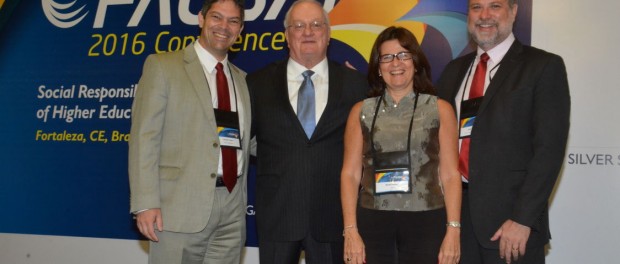Social Responsibility and Comprehensive Internationalization in Focus on the Faubai Conference 2016

From April 16 to 21, the city of Fortaleza hosted the 28th edition of the Faubai Conference, an annual event addressing Brazilian and Global tendencies and best practices for international education. This year the main theme was social responsibility in the process of internationalization of universities.
More than 600 people from 93 countries attended the conference on dozens of plenary and parallel sessions. The first day of the event was dedicated to a series of workshops addressing topics like management of international relations offices, successful experiences of academic credit recognition, and opportunities for Brazilian universities abroad.
Sunday’s conference, on April 17, was officially opened by John Hudzik, from U.S., with a lecture titled Internationalizing Brazil’s Higher Education Institutions: Many Institutional Pathways, Opportunities for All. Hudzik, who wrote a series of books on internationalization of higher education, highlighted the importance of introducing the process of internationalization into all areas of the university in order to turn ideas into practical action.
“Today Brazilian universities already encompass teaching, research, and extension. Internationalization should not be seen as one more function, but as a value to be added to those and to all other responsibilities of the institution,” says the manager, who has been working on this subject since 1998, when he assumed the post of dean of International Programs and Global Engagement at the Michigan State University. After that, Hudzik served as president of the Association of International Education Administrators (AIEA) and of the Board of Directors of the Association of International Educators (NAFSA), two of the main organizations dealing with the internationalization of higher education in the United States.
MSU’s professor suggests that a culture of institutionally supported internationalization should be encouraged inside the university so that this process is not restricted to international relations offices. Also important is designing consistent projects that can be accomplished in a feasible manner.
For Hudzik, internationalization is a trend that will not be reversed in the next few years, despite the economic crisis. Based on global data, he considers that middle-class growth and the interest shown by private higher education institutions should give the necessary impetus to the process. “What we have seen, based on data from other countries which experienced periods of economic turbulence, is that recession didn’t impact mobility numbers so seriously,” professor says optimistically.
Social Responsibility
Social responsibility was a central theme throughout the event, with sessions around experiences of minorities in the process of internationalization or discussions about the role of European higher education institutions in tackling the refugee crisis, one of the most important issues facing the continent today.
One of the lectures addressed Germany’s situation in the face of this crisis. Throughout the year 2015, Germany took in almost one million refugees, which led the German Academic Exchange Service (Deutscher Akademischer Austauschdienst, DAAD) to create programs to award scholarships at partner universities in Lebanon, Turkey, Jordan or Iraq, since refugees are mostly hosted in Syria’s neighboring countries. In Germany, universities have made efforts to identify these refugees’ skills and offer them preparation courses for college admission tests and language courses, as well as a program designed for Syrian young leaders.
According to Christian Müller, director of the DAAD branch office in Rio de Janeiro, the refugee issue has forced German universities to review their concept of science-oriented education. “They don’t like to be seen as professional education institutions, but it is important to solve the problems concerning this group’s education with a view to their integration in the local labor market”, he argues.
Social Inclusion and Internationalization
At the plenary session on the inclusion of minorities in the process of internationalization, Arlene Jackson, who runs Global Initiatives at the American Association of State Colleges and Universities (AASCU), emphasized the need to diversify internationalization strategies in order to make this process more inclusive.
“Short-term mobility sees the largest increase in the U.S., as it allows inclusion of working students, student mothers, and students from low-income families,” says Jackson, who manages an association representing more than 400 higher education institutions in the U.S. “Those are groups which cannot afford to stay away from their home countries for an entire year.” For Jackson, universities need to be innovative when selecting their partners and give priority to institutions which develop minority-inclusive programs.
Extension
Use of technologies to promote international interactions is the basis of a project developed by Coventry University in the United Kingdom. The project presented by the director of international relations Lídia Martinez is part of a Master’s degree program called Humanitarian Engineering and Computing, which uses Engineering and Computing resources to seek community-sensitive solutions to problems.
The projects, which initially focused only on the local community, became global with a partnership with the Faculty of Industrial Engineering (Faculdade de Engenharia Industrial, FEI) in São Paulo. “Students from both universities started to work in groups in order to find solutions to problems in their own communities. Everything is discussed and planned using communication tools, without face-to-face meetings,” explains Lídia, who also points out the originality of this initiative. The University projects include developing water-efficient toilets and educational games for children.
“Many academics in Coventry University are engaged in Humanitarian Engineering. The recent international engagement is helping to strengthen this community-sensitive policy inside the university,” she explains.
